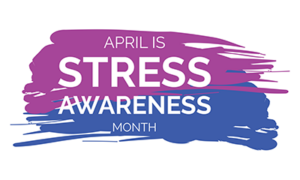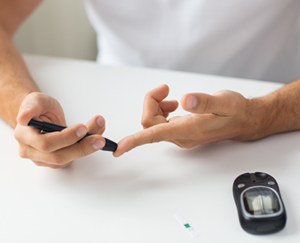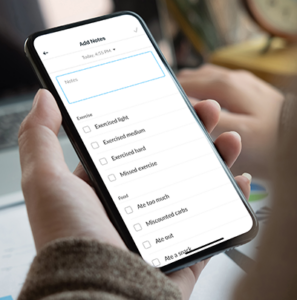

Picture this: it’s Tuesday and you start off your day the way you typically would. You wake up and go for a 30-minute walk before work, eat your typical lunch at your typical lunch time, and make sure to drink water throughout the day for your hydration. On any other Tuesday, these are typically the tools you have employed to promote blood sugars that are in range. Except for some reason, today is different…you check your blood sugar before leaving the office for a 3:30 pm dental appointment and it reads 250 mg/dl.
You start to experience more stress, but treat your high blood sugar according to your treatment plan and two hours later, your blood sugar reads 265 mg/dl.
But why?
If you’re looking for answers, you’ve come to the right place. Welcome to this month’s blog post about stress and diabetes in honor of Stress Awareness Month.
STRESS AND ITS IMPACT ON BLOOD SUGARS
 When you experience stress, your body releases hormones, such as cortisol and adrenaline. These hormones trigger the liver to release glucose into your bloodstream, which your body then uses for energy in response to the stress (aka the fight-or-flight response).
When you experience stress, your body releases hormones, such as cortisol and adrenaline. These hormones trigger the liver to release glucose into your bloodstream, which your body then uses for energy in response to the stress (aka the fight-or-flight response).
This can be helpful for some people as it provides them with the energy they need to take on the stressor. For people with diabetes, it can lead to increased blood sugar levels and insulin resistance as their bodies may not produce enough insulin (or any at all) to regulate the new increase in glucose levels. These hormones also can prevent the insulin your body is producing, or you are taking, from working as they normally would—making it even more difficult to return to your baseline.
TYPES OF STRESS
Now that you know how stress can impact your body and diabetes management…did you know there are different types of stress?
Physical stress refers to the physiological or biological demands placed on the body that require it to adapt to a new or challenging environment. Physical stress can come from a variety of things such as exercise, illness, or injury.
Mental stress refers to the psychological and emotional demands placed on an individual that can lead to feelings of strain or tension. Mental stress can come from a variety of things such as work, school, relationships, financial concerns, or health issues.
While both of these types of stress can develop quickly and resolve (acute), they can also be chronic (long-term) and lead to a range of other long-term issues with blood pressure, cardiovascular disease, insulin resistance, mental health, sleep, and your ability to care for your diabetes. It is also worth noting that stress can also be either positive or negative, so something like planning a vacation, wedding or new job can impact your stress levels in a similar way to a traumatic event like going to the dentist can.
Even positive stress can become negative if it becomes too overwhelming or persistent. The best way to counteract the impacts of stress on your body is learning the best ways for you to cope with the stress. Learning to manage stress through self-care practices and seeking support when needed from your community or care team can help to maintain a healthy balance of stress and reduce its impacts on your health.
SYMPTOMS OF STRESS
According to Healthline, these are the symptoms of stress:
Physical symptoms:
-
headaches
-
muscle pain or tension
-
sleeping too much or too little
-
general feelings of illness
-
fatigue
Mental symptoms:
-
feeling unmotivated
-
feeling irritable
-
feeling depressed
-
feeling restless
-
feeling anxious
Stress can also cause you to exhibit behavior that is not typical for your day-to-day, including:
-
withdrawing from friends and family
-
eating too much or too little (which can impact blood sugar levels!)
-
acting out in anger
-
drinking alcohol to excess (which can also impact blood sugar levels!)
-
using tobacco (nicotine can raise blood sugar levels)
Knowing what to look out for can help you react and practice the best self-care routine or coping mechanisms for you!
WAYS TO RELIEVE STRESS
 Some people find that doing things like moving their bodies on a regular basis, eating nourishing foods that foster and benefit mental health, practicing relaxation methods and breathing techniques, stretching, listening to music, or meditation can help them manage their stress levels in an optimal way.
Some people find that doing things like moving their bodies on a regular basis, eating nourishing foods that foster and benefit mental health, practicing relaxation methods and breathing techniques, stretching, listening to music, or meditation can help them manage their stress levels in an optimal way.
Others may find success in seeking social support from friends and family or their online community. Personally, I like to use a combination of these tactics to help minimize the impact of stress on my body and diabetes management. You can also work with your team to have a “sick day” plan or regimen to help counteract the insulin resistance you may be experiencing.
If you’re looking for a good place to start destressing, check out resources from these leading organizations:
-
Connected In Motion Slipstreams (Virtual and In-Person)
-
Insulin Inclusive (Diversity in Diabetes, Risely Health and BlackDiabeticGirl)
-
American Diabetes Association’s Mental Health Care Provider Directory
 Stress is another factor that can impact blood sugar levels, but making sure that we have the correct tools in our tool belt needed can help minimize its effects on our blood sugars and diabetes management. Choose one method or a few from the above suggestions and observe how these impact your stress levels.
Stress is another factor that can impact blood sugar levels, but making sure that we have the correct tools in our tool belt needed can help minimize its effects on our blood sugars and diabetes management. Choose one method or a few from the above suggestions and observe how these impact your stress levels.
Make it a point to take notes in your Glooko Mobile App whenever you are experiencing stressful situations and track how the methods are working for you, so you can discuss with your provider at your next visit!
Your friend in food (and diabetes),
Bridget Wood, RD, LD, CDCES
In honor of the 50th anniversary of the Association of Diabetes Care and Education Specialists (ADCES), Glooko’s very own Bridget Wood, RD, LD, CDCES was recognized as a featured member. Check out an article highlighting her work advancing diabetes care and education.
MKT-0447 01

 Germany
Germany  Spain
Spain  France
France